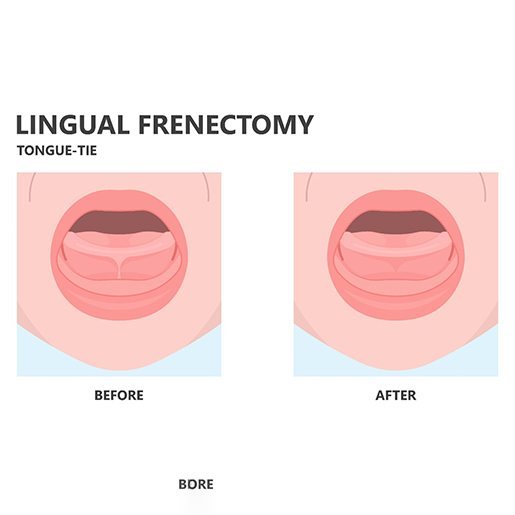Lip & Tongue Tie Treatment – Willow Park, TX
Frenectomy for Freer, More Comfortable Movement
Does your baby have difficulty breastfeeding, or does your child struggle to speak clearly? This could be due to lip or tongue-tie. This occurs when there is an overdeveloped band of tissue in the mouth that is restricting the movement of the lips or tongue. The good news is that at Stroud Pediatric Dentistry, we can provide a frenectomy for freer, more comfortable movement for your child. Give us a call to schedule your child an appointment and find out if a frenectomy is the right option for them.
Why Choose Stroud Pediatric Dentistry for Lip & Tongue Tie Treatment?
- Soft-Tissue Laser for Maximum Comfort
- Quick Treatment for Children
- Dental Insurance Welcome
How Do Lip and Tongue Ties Develop?

Lip and tongue ties result from thick, malformed tissues in the mouth. Lip ties are when the tissue that connects the lips to the gums is too short or thick, therefore preventing the lips from moving freely. If this is the case for an infant, this can make it more difficult to breastfeed. Tongue ties result from a lingual frenulum, the tissue that connects the tongue to the floor of the mouth, that is too short, thick, or malformed. Here are some signs that your child may have a lip or tongue tie:
- Difficulty latching during breastfeeding
- Digestive issues, like colic or reflux
- Being unable to hold a pacifier in their mouth
- Prolonged nursing sessions
Why is it Important to Treat Lip & Tongue Ties?

When left untreated, lip and tongue ties can lead to different developmental issues for children. Some of the most prominent include:
- Difficulty speaking or speech delays
- Digestive problems, like acid reflux
- Breathing difficulties and airway issues
- Forward head and neck posture
- Teeth grinding (bruxism)
If you’re concerned about your child having a lip or tongue tie, we can examine their smile to determine if this is the case and its severity. This way, we can create a treatment plan to meet their unique needs.
Lip & Tongue Tie Treatment

The most common way to address lip tie or tongue tie is with a quick and simple procedure known as a “frenectomy.” This treatment is designed to be quick and comfortable. First, we start by numbing the area of the mouth with a local anesthetic. Next, we will use our state-of-the-art soft-tissue laser to remove excess tissue. This advanced technology is precise and ideal for a comfortable procedure, reduced risk of infection, and quick healing time.
Lip & Tongue-Tie FAQs

For lots of people, the only thing more stressful than going to the dentist themselves is taking their kids. That goes double for younger children, as their parents often aren’t used to leaving their kids in the care of a health professional.
That’s why we get a fair number of questions about lips and tongue ties from concerned patients who want to know more about the procedure. You’ll be glad to know that we’re here for you and will be willing to answer any questions you have—here are just a few examples of ones we get often.
Does a Frenectomy Hurt?
At Stroud Pediatric Dentistry, we make use of a soft-tissue laser in our frenectomies. This cutting-edge dental technique targets only the excess tissue and cauterizes the wound instantly. This massively reduces the amount of bleeding and discomfort associated with the treatment.
As a consequence, the frenectomies we perform will be completely painless. Most of the time they don’t even require local anesthesia, though we’ll be happy to provide it if you’d like.
Can I Be in the Room During My Child’s Frenectomy?
When we’re performing the frenectomy, we need to be completely focused on your child. While not the case for every parent, some people can become distressed watching their child undergo any kind of procedure. For that reason, parents generally aren’t permitted in the room while the frenectomy is being done.
Don’t worry—the treatment will be brief, and you’ll be able to see your child again as soon as it is done.
When Can I Start Nursing My Baby After a Frenectomy?
Your child will be able to breastfeed immediately after the treatment. In many cases, this is encouraged; feeding can help to calm the baby down and provides them with essential nutrients needed for healing.
Many times, you’ll be able to notice the benefits of the frenectomy immediately after the procedure is completed, and they’ll latch much more easily than they’ve been able to before. If your baby still struggles, be patient, as they may just need time to adjust to the motion of their tongue.
What Are the Dangers of Doing a Frenectomy Yourself?
Frenectomies seem like they’re as simple as just snipping a bit of tissue, and for trained professionals they are. However, if someone with no experience took one on, there are substantial risks for complications.
Someone without experience could accidentally take off too much of the frenulum, causing significant bleeding and pain. The area may also become infected, especially if the tools used aren’t sterile. We value your child’s health as much as you do, which is why we would strongly recommend against trying to complete a frenectomy on your own.
